Underperform
What does 'Underperform' mean Underperform is an analyst recommendation when a stock is expected to do slightly worse than the market return. Also known as market underperform, moderate sell, or weak hold. Explaining 'Underperform' Exact definitions vary between brokerages, but in general this rating is worse than neutral but better than sell or...
Offset
What does 'Offset' mean An offset involves assuming an opposite position in regards to the original opening position. Additionally, to offset is to liquidate a futures position by entering an equivalent but opposite transaction that eliminates the delivery obligation. The goal of offsetting is to reduce an investor's net position in an investment to zero so that...
Interest Rates
Definition Interest rates are the percentage of a loan that a lender charges for borrowing money. The interest rate is the cost you pay each year to borrow money, and is typically represented as an annual percentage rate (APR). Lenders use different methods to calculate interest rates, but the most common is the prime rate plus a margin. The prime...
Debt
Debt means anything that is either owed and/or due. The parties to any debt are referred to as lenders i.e. those who give, and borrowers or those who receive loan. Usage Debt is used both by corporate entities as well as private parties as a means of making a big purchase that the individuals or corporations concerned would not have been able to pay for, with their existing...
Premium Definition
Premium, in the simplest of terms, is the total cost of any option. It is basically the sum of your option’s time and intrinsic value. When it comes to insurance, it is the amount that is required by an insurer in order to give coverage under an insurance plan for a given time period. One common example of insurance premium...
Inflation
Inflation is well defined as a sustained increase in the general level of prices for goods and services wherein the purchasing power falls. It is measured as an annual percentage increase. As inflation rises, every penny you own buys a smaller percentage of good or service. Banks attempt to limit inflation and avoid deflation to keep the economy running...
Sale
What is a 'Sale' A sale is a transaction between two parties where the buyer receives goods (tangible or intangible), services and/or assets in exchange for money. It can also refer to an agreement between a buyer and seller on the price of a security. A sale functions as a contract between the buyer and seller of...
Home Mortgage
DefinitionA mortgage loan or, simply, mortgage is used either by purchasers of real property to raise funds to buy real estate, or alternatively by existing property owners to raise funds for any purpose, while putting a lien on the property being mortgaged. The loan is "secured" on the borrower's property through a process known as mortgage origination. This means...
Quid
What is 'Quid' The pound sterling, sometimes known as the British pound, is the currency of the United Kingdom, and the quid is a slang name for it. Quids are 100 pence, and it is said to have originated from the Latin term "quid pro quo," which literally means "something for something," or an equal exchange of goods and services...
Underlying
What does 'Underlying' mean Underlying, in equities, is the common stock that must be delivered when a warrant is exercised, or when a convertible bond or convertible preferred share is converted to common stock. The price of the underlying is the main factor that determines prices of derivative securities, warrants and convertibles. Thus, a change in an underlying results in...


































